

Bai Chunli is turning the tassel for graduates. [Image: CAS]
The 2019 Graduation Ceremony of the University of Chinese Academy of Sciences (UCAS) was held simultaneously on its two campuses in Beijing’s Shijingshan and Huairou districts on July 2.
Li Shushen, president of UCAS, sent out an invitation to the graduates to reunite as alumni 30 years from now.
The ceremony was attended by Bai Chunli, president of the Chinese Academy of Sciences (CAS).
He urged broad vision and inclusive minds in cooperation, learning from brilliant individuals whether academic giants or teachers and fellow students and cherishing friendly sentiments with teachers and mutual help between alumni.
Li Shushen said the ability to learn, to create and to concentrate are the keys to success in the future. He encouraged the graduates to keep their passion to explore the world,
to maximize their potential, to dare to break down routine and never to lose heart because of failures.
Yang Shuyuan, one of the undergraduates, said in her speech at the ceremony that the sense of responsibility and mission she gained during her study at UCAS will help her develop and learn to shoulder responsibility for herself, her family and her alma mater.
Yang Shuyuan gives a speech at the ceremony. [Image: UCAS]
Cao Xing, a doctoral graduate thanked the university and vowed to integrate personal needs and growth into national demands and development so as to contribute to the country and society.
Cao Xing gives a speech at the ceremony. [Image: UCAS]
Mads Vesterager Nielsen, a foreign postgraduate student from Denmark said he would help build closer ties between the two countries via his work at the Danish Chamber of Commerce in China.
Mads Vesterager Nielsen gives a speech at the ceremony. [Image: UCAS]
According to reports, 309 undergraduates and 5,605 doctoral students graduated from the university in 2019. There are 271 undergraduates choosing to continue their postgraduate studies, including 69 planning to study abroad.
Some of the undergraduates participated in writing academic papers for top international journals like Nature. A total of 67 papers were published by this year’s doctoral graduates in Science, Nature, Cell and Proceedings of the National Academy of Sciences of the United States of America. They published 9,938 SCI papers and 2,028 in EI citations.
A chorus from the University of Science and Technology of China (USTC) performed at the university’s graduation ceremony for its doctoral and postgraduate students.
The graduation ceremony for USTC doctoral and postgraduate students was held recently in Hefei, Anhui province. [Image: USTC]
Bao Xinhe, president of the university, suggested in his commencement speech that the students will pursue their dreams no matter how tough the journey is and hoped they will shoulder their responsibilities, reach high and cultivate their moral character.
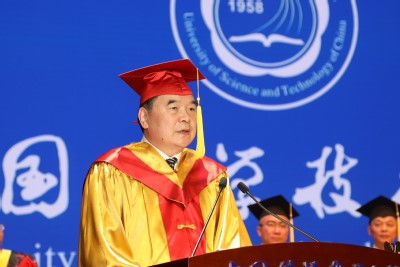
Bao Xinhe, president of USTC, addresses the commencement ceremony. [Image: USTC]
Zeng Jie, a mentor representative, congratulated the graduates and said that the faith of integrating personal development into national rejuvenation can guide people to take the lead in their industry and position.
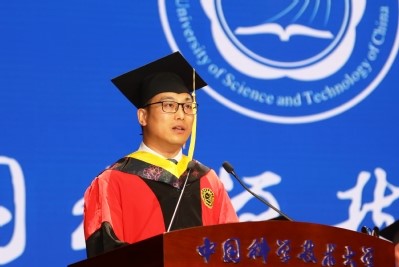
Zeng Jie, a mentor representative, gives a speech at the ceremony. [Image: USTC]
Lyu Song, one of the most outstanding USTC graduates, recalls his study in the university, expressing his sincere gratitude to the alma mater and faculty for providing such a good environment and a high-end academic research platform. He also promised to contribute to society in the new era in his speech.
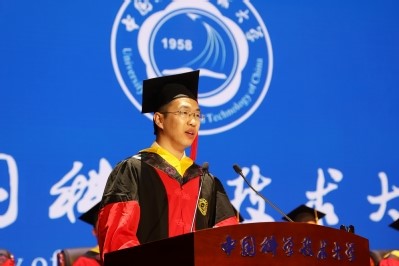
Lyu Song gives a speech as a representative of outstanding USTC graduates at the ceremony. [Image: USTC]
On the evening of June 14th, the 2019 Eternal USTCer graduation ceremony and See You graduation party were held at the auditorium in the east campus of the University of Science and Technology of China (USTC). When a group of USTC students is about to graduate, such a grand party is held so the graduates can spend a good time together, make wishes, encourage each other, and say goodbye. The university leaders and alumni accompanied by nearly 2000 graduates crowded into the auditorium.
The graduation ceremony of ShanghaiTech University was held on June 29, with 270 undergraduates, 140 postgraduates and 69 doctoral graduates receiving their degree certificates.
ShanghaiTech University President Jiang Mianheng addressed the ceremony, saying that the university looks forward to seeing more young and promising talents thrive and reach high in an environment full of innovation and vitality.
He encouraged students to continue the tradition of struggle and uphold the spirit of hard work in the future.
Jiang also reminded the graduates planning to further their studies abroad that the motherland is their strong backing and urged a good tradition of learning and plain living.
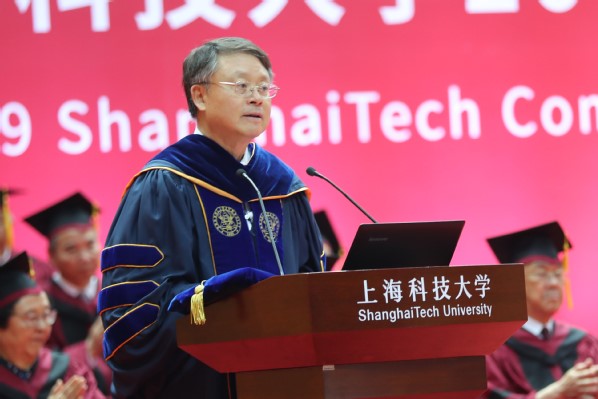
Jiang Mianheng, president of ShanghaiTech University, addresses the graduation ceremony on June 29. [Image: ShanghaiTech University]
Li Xiaoting, a postgraduate representative, said her personal academic achievements could not have been made without the schooling and scientific atmosphere in the university, which she witnessed from 2013 to 2019.
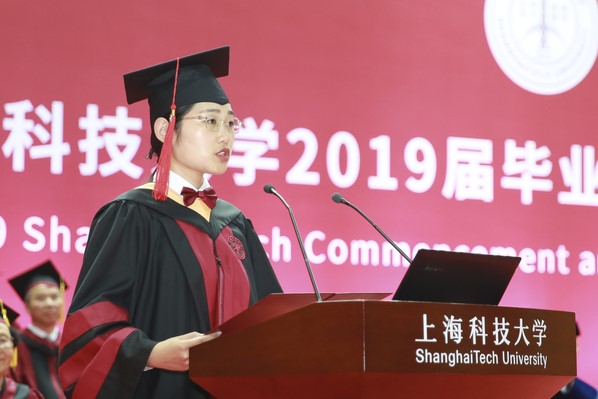
Li Xiaoting, a postgraduate representative of ShanghaiTech University, makes a speech at the ceremony. [Image: ShanghaiTech University]
Yu Jingyi, a professor and deputy dean of School of Information Science and Technology inspired the graduating students with the story of Geoff Hinton, a winner of the Turing Award, the highest distinction in computer science and hailed the graduates as “natural creators and pioneers” with down-to-earth practice, bold thinking, and open attitudes about competition and cooperation.
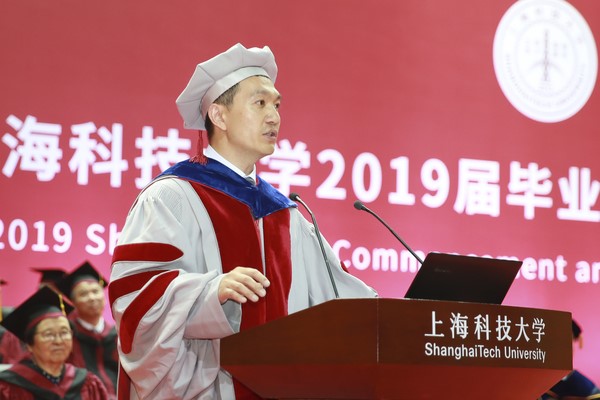
Yu Jingyi, a professor and deputy dean of the School of Information Science and Technology, cites the example of Geoff Hinton to inspire the graduating students in his speech. [Image: ShanghaiTech University]
Statistics showed that 39 percent of the undergraduates received 196 offers from 12 countries and regions to further their studies, including about half of them offered by the top 50 universities in the world.
The undergraduates choosing to continue their postgraduate studies in China and to get an employment account for 37 percent and 18 percent, respectively.
About 50 percent of the postgraduate students will continue their doctoral program at the university and 7 percent will further their study abroad while 3 percent will study in other domestic universities and 1 percent will start a business.
Among the 69 doctoral graduates, 32 percent will work abroad and 17 percent will conduct post-doctoral research in China.